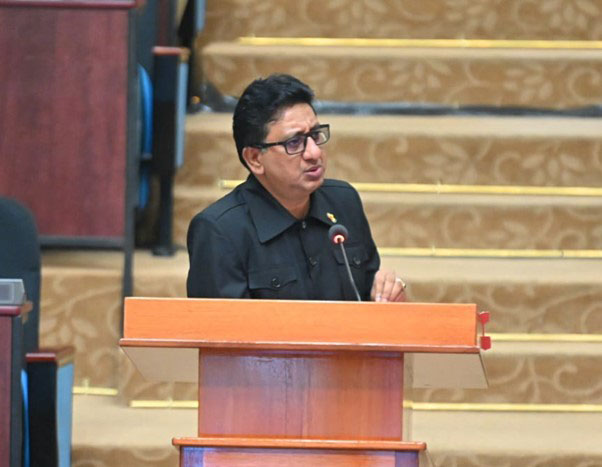-no fault divorce, gender equality among key provisions
The Matrimonial Causes (Amendment) Bill was yesterday passed with broad support in the National Assembly and will enshrine no fault divorces and other progressive provisions such as alimony for both men and women.
The proposed changes address fundamental aspects of family law, reflecting a significant shift in the regulation of marriage and divorce in Guyana. This bill promises to profoundly impact the lives of every Guyanese, according to Attorney General and Minister of Legal Affairs Anil Nandlall and marks the culmination of a process that began 16 years ago when Education Minister Priya Manickchand was serving as Minister of Human Services.
The Matrimonial Causes Act, which has governed marriage and divorce in Guyana for nearly 90 years, is set for a comprehensive revision. Originally established under British colonial rule, the act has remained largely unchanged since its adoption in 1937. At that time, the law allowed for divorce only on grounds such as adultery, cruelty, sodomy, desertion, and bestiality. This framework, rooted in outdated values and societal norms, has long been criticized for failing to accommodate contemporary understandings of gender equality and marital relations.
Historically, the law mirrored the UK’s legal system prior to its repeal in England over 50 years ago. The current Guyanese legislation, including Chapter 45:02, has been criticized for maintaining provisions that are no longer reflective of modern values, particularly in terms of gender equality. For instance, recent legal challenges have highlighted discrepancies where only wives were entitled to seek alimony, which a high court ruling deemed unconstitutional.
The new bill introduces several key changes aimed at modernizing family law. Among the most notable amendments are:
– Abolition of Restitution of Conjugal Rights: The bill removes the provision allowing one spouse to compel the other to return to the marital home, a move intended to prevent the forced continuation of marital relations.
– Introduction of Irreconcilable Differences: For the first time, irreconcilable differences will be recognized as grounds for divorce, allowing couples to dissolve their marriage without proving fault.
– Gender Equality in Legal Protections: The bill ensures that both spouses receive equal protection and rights concerning property, alimony, and judicial orders. Previously, such protections were predominantly extended to wives.
– Equal Alimony Rights: The amendment provides for both husbands and wives to claim alimony, addressing previous imbalances in financial support.
– Revised Judicial Separation Grounds: The new bill allows for judicial separation on similar grounds as divorce and introduces irreconcilable differences as a new basis for separation.
In her speech advocating for the new bill, Manickchand highlighted statistics from recent years. Between 2018 and 2023, the General Register Office recorded 26,546 legal marriages. During the same period, the Supreme Court Registry documented 8,022 divorce petitions filed in Georgetown, with 6,836 being uncontested and 317 contested. The proposed amendments aim to facilitate a more dignified process for marriage dissolution, minimizing the need for public court proceedings to prove the end of a marriage. Notably, 85% of couples who filed for divorce during this timeframe agreed that their marriages had irretrievably ended.
Nandlall emphasized that the proposed amendments will not only modernize Guyana’s matrimonial laws but also better reflect the evolving social realities and values of the country. The changes are expected to address longstanding issues and provide a more equitable framework for resolving family disputes.
This Bill seeks to amend the Matri-monial Causes Act Cap. 45:02 to address and reform spousal maintenance laws by removing discriminatory provisions and ensuring alignment with fundamental constitutional rights. Currently, Section 14 of the Principal Act requires that upon dissolution or nullity of marriage, the husband must pay maintenance or alimony to the wife. The High Court has found this provision discriminatory, as it does not allow for a wife to be ordered to pay maintenance or alimony to a husband. This was deemed a violation of Articles 149 and 149D of the Constitution of Guyana, which prohibit discrimination based on sex and gender and guarantee equality before the law.
In addition to this primary amendment, the Bill proposes further revisions to the Principal Act and specific sections of the Summary Jurisdiction (Magistrates) Act, Cap. 30:05. These revisions aim to make maintenance and property protection provisions applicable to both spouses, rather than solely to wives. The Bill also seeks to amend provisions related to the reversal of judicial separation decrees, ensuring that alimony payment obligations apply equally to both husbands and wives. Additionally, it proposes extending responsibilities related to covering costs for adultery to both spouses.
The Bill introduces a new ground for the dissolution of marriage based on irreconcilable differences after a 6-month separation period. It also includes provisions for modifying cessation orders when there is a change in the financial means of either or both parties.
The bill received broad support from members of Parliament, including Haimraj Rajkumar, Geeta Chandan-Edmond and Volda Lawrence from the Opposition and Minister in the Ministry of Housing and Water Susan Rodrigues.






